商务翻译实务第十单元公关文稿翻译资料
- 格式:pdf
- 大小:20.61 MB
- 文档页数:110

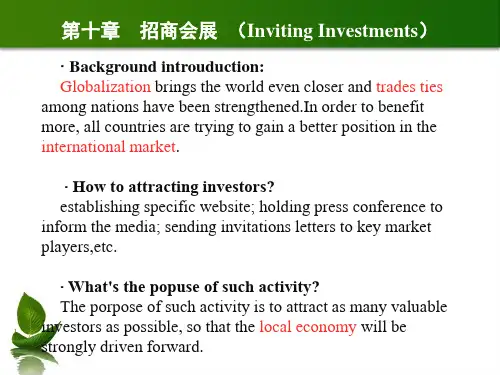

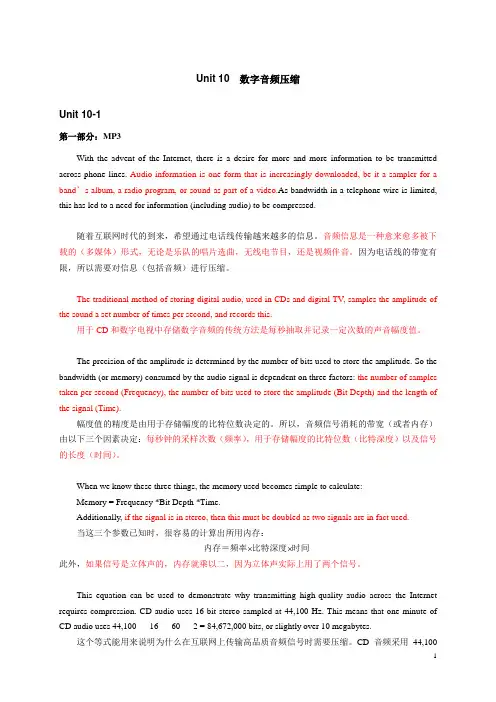
Unit 10 数字音频压缩Unit 10-1第一部分:MP3With the advent of the Internet, there is a desire for more and more information to be transmitted across phone lines. Audio information is one form that is increasingly downloaded, be it a sampler for a band’s album, a radio program, or sound as part of a video.As bandwidth in a telephone wire is limited, this has led to a need for information (including audio) to be compressed.随着互联网时代的到来,希望通过电话线传输越来越多的信息。
音频信息是一种愈来愈多被下载的(多媒体)形式,无论是乐队的唱片选曲,无线电节目,还是视频伴音。
因为电话线的带宽有限,所以需要对信息(包括音频)进行压缩。
The traditional method of storing digital audio, used in CDs and digital TV, samples the amplitude of the sound a set number of times per second, and records this.用于CD和数字电视中存储数字音频的传统方法是每秒抽取并记录一定次数的声音幅度值。
The precision of the amplitude is determined by the number of bits used to store the amplitude. So the bandwidth (or memory) consumed by the audio signal is dependent on three factors: the number of samples taken per second (Frequency), the number of bits used to store the amplitude (Bit Depth) and the length of the signal (Time).幅度值的精度是由用于存储幅度的比特位数决定的。
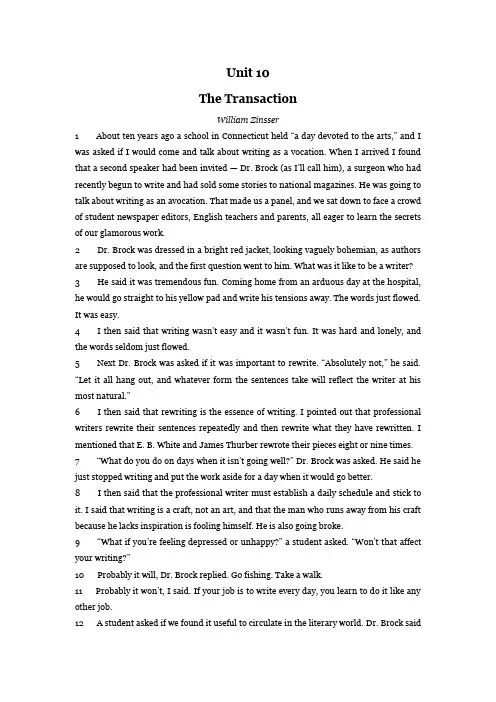
Unit 10The TransactionWilliam Zinsser1 About ten years ago a school in Connecticut held “a day devoted to the arts,” and I was asked if I would come and talk about writing as a vocation. When I arrived I found that a second speaker had been invited —Dr. Brock (as I’ll call him), a surgeon who had recently begun to write and had sold some stories to national magazines. He was going to talk about writing as an avocation. That made us a panel, and we sat down to face a crowd of student newspaper editors, English teachers and parents, all eager to learn the secrets of our glamorous work.2 Dr. Brock was dressed in a bright red jacket, looking vaguely bohemian, as authors are supposed to look, and the first question went to him. What was it like to be a writer?3 He said it was tremendous fun. Coming home from an arduous day at the hospital, he would go straight to his yellow pad and write his tensions away. The words just flowed. It was easy.4 I then said that writing wasn’t easy and it wasn’t f un. It was hard and lonely, and the words seldom just flowed.5 Next Dr. Brock was asked if it was important to rewrite. “Absolutely not,” he said. “Let it all hang out, and whatever form the sentences take will reflect the writer at his most natural.”6 I then said that rewriting is the essence of writing. I pointed out that professional writers rewrite their sentences repeatedly and then rewrite what they have rewritten. I mentioned that E. B. White and James Thurber rewrote their pieces eight or nine times.7 “What do you do on days when it isn’t going well?” Dr. Brock was asked. He said he just stopped writing and put the work aside for a day when it would go better.8 I then said that the professional writer must establish a daily schedule and stick to it. I said that writing is a craft, not an art, and that the man who runs away from his craft because he lacks inspiration is fooling himself. He is also going broke.9 “What if you’re feeling depressed or unhappy?” a student asked. “Won’t t hat affect your writing?”10 Probably it will, Dr. Brock replied. Go fishing. Take a walk.11 Probably it won’t, I said. If your job is to write every day, you learn to do it like any other job.12 A student asked if we found it useful to circulate in the literary world. Dr. Brock saidthat he was greatly enjoying his new life as a man of letters, and he told several stories of being taken to lunch by his publisher and his agent at chic Manhattan restaurants where writers and editors gather. I said that professional writers are solitary drudges who seldom see other writers.13 “Do you put symbolism in your writing?” a student asked me.14 “Not if I can help it,” I replied. I have an unbroken record of missing the deeper meaning in any story, play or movie, and as for dance and mime, I have never had even a remote notion of what is being conveyed.15 “I love symbols!” Dr. Brock exclaimed, and he described with gusto the joys of weaving them through his work.16 So the morning went, and it was a revelation to all of us. At the end Dr. Brock told me he was enormously interested in my answers —it had never occurred to him that writing could be hard. I told him I was just as interested in his answers — it had never occurred to me that writing could be easy. (Maybe I should take up surgery on the side.)17 As for the students, anyone might think we left them bewildered. But in fact we probably gave them a broader glimpse of the writing process than if only one of us had talked. For of course there isn’t any “right” way to do such intensely personal work. There are all kinds of writers and all kinds of methods, and any method that helps people to say what they want to say is the right method for them.18 Some people write by day, others by night. Some people need silence, others turn on the radio. Some write by hand, some by typewriter or word processor, some by talking into a tape recorder. Some people write their first draft in one long burst and then revise; others can’t write the second paragrap h until they have fiddled endlessly with the first. 19 But all of them are vulnerable and all of them are tense. They are driven by a compulsion to put some part of themselves on paper, and yet they don’t just write what comes naturally. They sit down to commit an act of literature, and the self who emerges on paper is a far stiffer person than the one who sat down. The problem is to find the real man or woman behind all the tension.20 For ultimately the product that any writer has to sell is not the subject being written about, but who he or she is. I often find myself reading with interest about a topic I never thought would interest me — some unusual scientific quest, for instance. What holds me is the enthusiasm of the writer for his field. How was he drawn into it? What emotional baggage did he bring along? How did it change his life? It’s not necessary to want to spend a year alone at Walden Pond to become deeply involved with a writer who did.21 This is the personal transaction that’s at the he art of good nonfiction writing. Out ofit come two of the most important qualities that this book will go in search of: humanity and warmth. Good writing has an aliveness that keeps the reader reading from one paragraph to the next, and it’s not a question of gimmicks to “personalize” the author. It’s a question of using the English language in a way that will achieve the greatest strength and the least clutter.22 Can such principles be taught? Maybe not. But most of them can be learned.汇通威廉·津瑟1. 大约十年前,康涅狄格州有所学校举办了一次“艺术日”活动,他们问我是否愿意去谈谈职业写作是怎么回事。
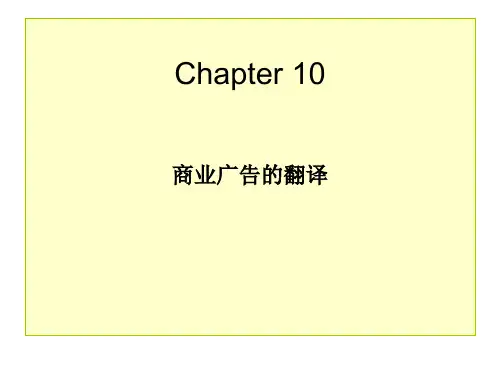
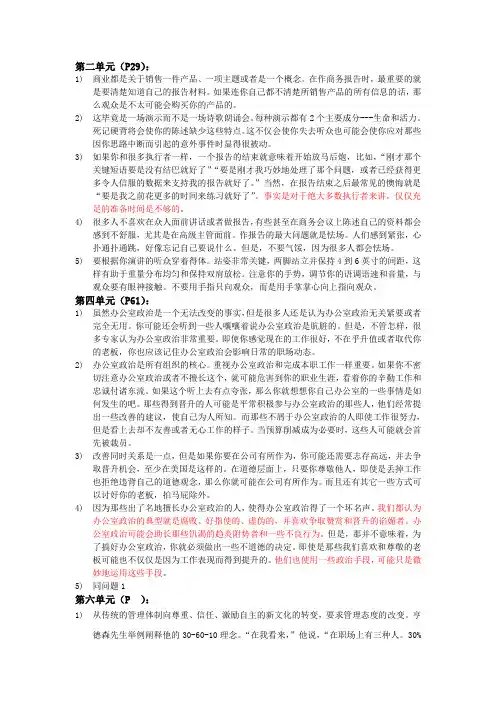
第二单元(P29):1)商业都是关于销售一件产品、一项主题或者是一个概念。
在作商务报告时,最重要的就是要清楚知道自己的报告材料。
如果连你自己都不清楚所销售产品的所有信息的话,那么观众是不太可能会购买你的产品的。
2)这毕竟是一场演示而不是一场诗歌朗诵会。
每种演示都有2个主要成分---生命和活力。
死记硬背将会使你的陈述缺少这些特点。
这不仅会使你失去听众也可能会使你应对那些因你思路中断而引起的意外事件时显得很被动。
3)如果你和很多执行者一样,一个报告的结束就意味着开始放马后炮,比如,“刚才那个关键短语要是没有结巴就好了”“要是刚才我巧妙地处理了那个问题,或者已经获得更多令人信服的数据来支持我的报告就好了。
”当然,在报告结束之后最常见的懊悔就是“要是我之前花更多的时间来练习就好了”。
事实是对于绝大多数执行者来讲,仅仅充足的准备时间是不够的。
4)很多人不喜欢在众人面前讲话或者做报告,有些甚至在商务会议上陈述自己的资料都会感到不舒服,尤其是在高级主管面前。
作报告的最大问题就是怯场。
人们感到紧张,心扑通扑通跳,好像忘记自己要说什么。
但是,不要气馁,因为很多人都会怯场。
5)要根据你演讲的听众穿着得体。
站姿非常关键,两脚站立并保持4到6英寸的间距,这样有助于重量分布均匀和保持双肩放松。
注意你的手势,调节你的语调语速和音量,与观众要有眼神接触。
不要用手指只向观众,而是用手掌掌心向上指向观众。
第四单元(P61):1)虽然办公室政治是一个无法改变的事实,但是很多人还是认为办公室政治无关紧要或者完全无用。
你可能还会听到一些人嚷嚷着说办公室政治是肮脏的。
但是,不管怎样,很多专家认为办公室政治非常重要。
即使你感觉现在的工作很好,不在乎升值或者取代你的老板,你也应该记住办公室政治会影响日常的职场动态。
2)办公室政治是所有组织的核心。
重视办公室政治和完成本职工作一样重要。
如果你不密切注意办公室政治或者不擅长这个,就可能危害到你的职业生涯,看着你的辛勤工作和忠诚付诸东流。
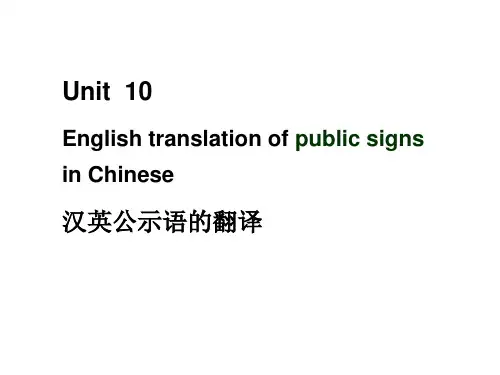

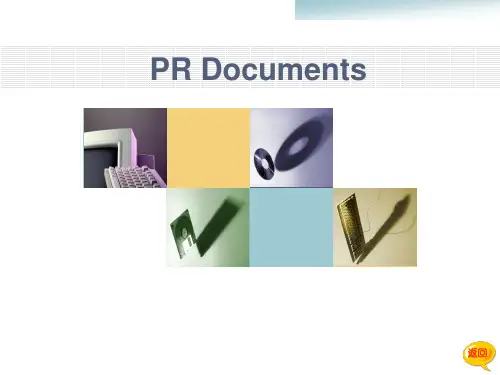

Paraphrase the following sentences into English in at least three forms:1.中国是社会主义国家,它的发展不会对其他国家构成威胁。
① As a socialist country, the development of China will constitute no threat to other countries.② The socialist nature makes it impossible for China, even when developed, to pose any threat to others.③China will not be a threat to other countries when it becomes developed itself, because it is a socialist country.2.我今天准备的题目是:美国的外交政策对中美关系的影响。
①My topic/the title of my presentation today is the impact of American foreign policies on Sino-US relationship.②Today I am going to talk about the implication of American foreign policies on Sino-US relationship.③Today I am going to discuss how the American foreign policies influence Sino-US relationship.3.直到15世纪以前,中国的科学技术在世界上保持了上千年的领先地位。
①China's science and technology had been in a leading position in the world for 1,000 years until the 15th century.② China had been a world leader in science and technology for 1,000 years until the 15th century.③China had been leading the world in science and technology for 1,000 years until the 15th century.4.中国的潜在市场同国外的先进技术和资金优势结合起来,就能形成众多的发展机遇和强大的发展活力。